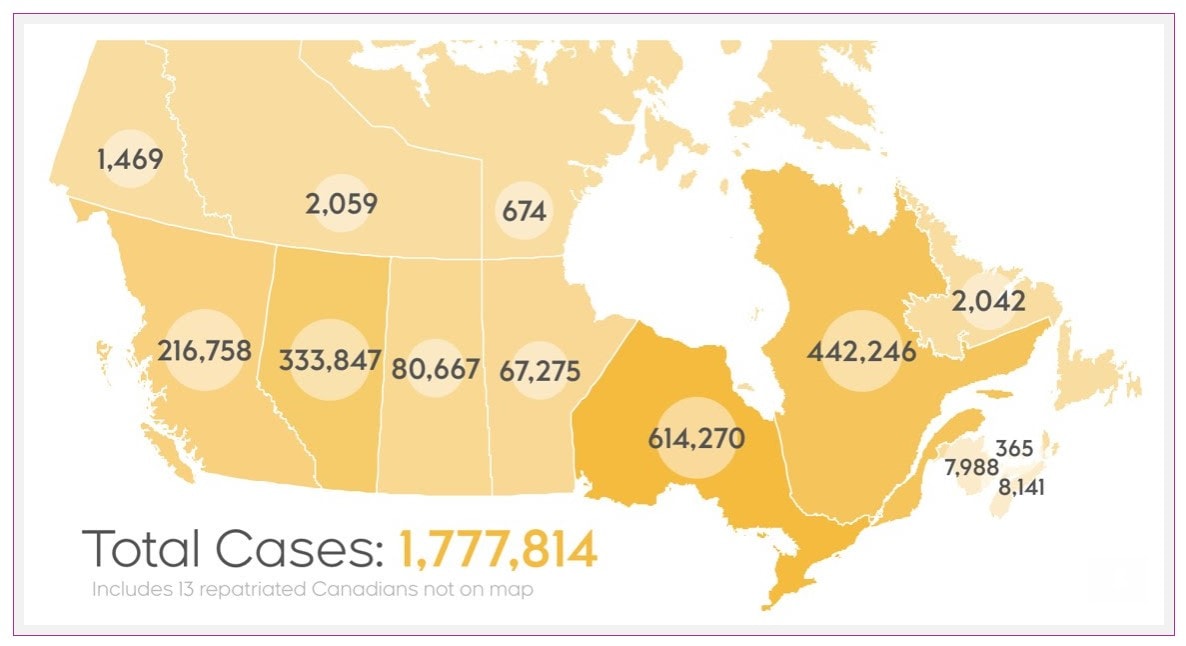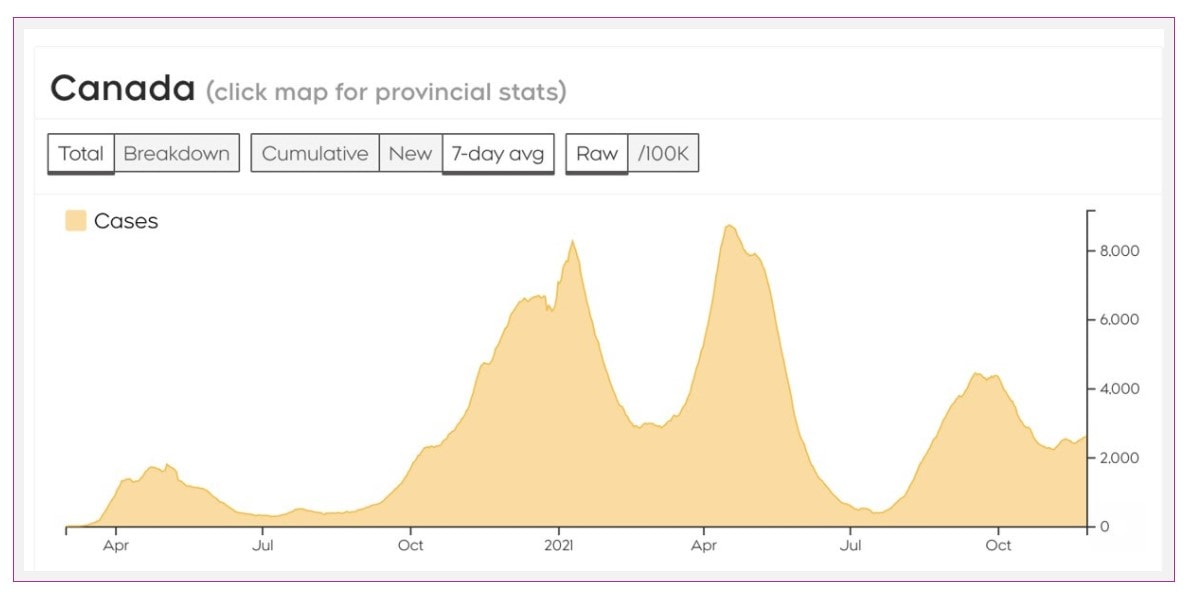Well, hello friends,
I hope you had a wonderful weekend. I appreciate all the kind words you sent last week. It is nice to know these newsletters are helpful for you and your loved ones.
Let us review the bad news, the good news, and the most common questions of the week. Then, finally, we will end, as we always do, on my silver lining.
Dr. Dina, what is the bad news?
There have been almost 260 MILLION cases of COVID-19 reported globally, with 5.2 MILLION deaths.
Almost 1.8 million cases have been reported in Canada, and nearly 29,600 people have died from COVID.
Cases in Canada are rising in some areas and plateauing in others. Ontario, Quebec, New Brunswick, Manitoba, Yukon, and Prince Edward Island have seen an uptick in case counts. Last week, Quebec logged the highest number of new cases in a single day since September.
Ontario saw numbers jump higher last week as well, with several days of > 700 new cases. As a result, emergency orders were extended, delaying the Reopening Ontario Act until March 2022.


It looks like Ontario vaccine mandates are here to stay, at least for a while. The head of Ontario’s COVID-19 Science Advisory Table, Dr. Peter Jüni, said last week, “When I look at what’s happening right now, and when I see what’s happening in Europe, the probability that we drop them in mid-January is next to zero percent.”
Areas in Europe have been battered in recent weeks, as we have discussed in recent newsletters. (by the way, all previous newsletters can be found here. I answer tons of questions you send me each week so that you can peruse them here at your leisure).
Last week Germany marked the tragic milestone of surpassing 100,000 deaths from COVID-19. They reached 76,000 new cases a day last week.
What is the good news?
Worldwide, almost 8 BILLION doses of COVID vaccines have been given. This represents nearly 54% of the WORLD’S POPULATION having received their first dose, and 42% are fully vaccinated.
In Canada, 83% of people have received the first dose, and 80% are fully vaccinated. Well done, Canada.
COVID-19 vaccines for kids aged 5-11 were given this week. In Quebec, 80,000 kids registered on the first day registration opened.
Vaccine Hunters Canada, a volunteer effort that helps Canadians find available vaccines, reactivated their accounts to provide updates on appointment availabilities for kids.
Do vaccines work?
They sure do! Data from a new Public Health Ontario report looking at COVID-19 cases among vaccinated individuals shows that well. There have been 17,596 breakthrough cases in the > 11 million fully vaccinated Ontarians in the last year. This is 3.8% of all lab-confirmed cases. In addition, only 9/83 people under age 60 who required hospitalization have needed ICU-level care. In comparison, 8,355 unvaccinated individuals under 60 were admitted to the hospital, and 1,722 required ICU care.
New vaccine approved
Health Canada gave full approval to use Johnson & Johnson on Wednesday for people 18 years and older. This is the first full approval for a vaccine globally. It is a single-dose shot and is not mRNA-based.
Questions of the week
Last week the Pfizer COVID-19 vaccine was given to kids 5-11 across the country. Lots of your questions poured in, and I answer some below.
Is the COVID-19 vaccine effective for kids?
Clinical trial data found the vaccine to be safe and 90.7% effective at preventing COVID-19 in children ages five to eleven.
Who is eligible for the COVID-19 vaccine?
Kids aged five or who turn five years old by the end of 2021 are now eligible to get the COVID-19 vaccine.
When and where can you book an appointment?
Appointments can be booked through the provincial COVID-19 vaccine portal or local public health units.
You can also book by calling the Ontario Vaccine Contract Centre at 1-833-943-3900 between 8 a.m. and 8 p.m. Individuals who are hearing impaired or speech impaired can call 1-866-797-0007.
A list of pharmacies giving the COVID-19 vaccine to kids can be found here.
Toronto Public Health opened 20,000 additional vaccine appointments at five city-run clinics located at the Scarborough Town Centre, Metro Toronto Convention Centre, Cloverdale Mall, Woodbine Mall, and Mitchell Field Arena.
Vaccines will soon be available at select school clinics.
What should we bring to the vaccine appointment?
Families should bring their booking confirmation code or email, an Ontario health card, and the child’s immunization record/card if available.
If a child has a known allergy to the Pfizer vaccine or any ingredients, or if they have reacted to a previous vaccination, they should review with their allergist/immunologist first and bring an allergy form to the appointment documenting the recommendations from the doctor.
Bring a mask for your child and you, as these must be worn in the vaccination center.
What happens if my child does not have an Ontario health card?
Kids without an Ontario health card can still get the COVID-19 vaccine.
Parents should speak with their child’s doctor, school, or faith leader about providing a letter confirming their name, date of birth, and address. Also, call your local public health unit to get a COVID ID, a unique number that will be used to book the appointment through the provincial vaccine contact center.
What happens if my child is not up to date with their other immunizations?
Children do not need to be up to date on their other vaccinations to receive the COVID-19 vaccine.
Do we need to space out the COVID-19 vaccine with other vaccines?
Officials recommend waiting 14 days before or after a child gets a different vaccine before getting the COVID-19 vaccine. If your child recently received a flu shot, wait 14 days before giving the COVID vaccine. Please chat with your child’s healthcare provider if you have any questions.
Do parents need to give permission for their child to receive a COVID-19 vaccine?
Officials say parental consent is “usually” necessary before or at the time of the vaccine appointment. Consent forms will be provided online and in paper at vaccine clinics.
Children must also provide informed consent.
Informed consent requires that the child understand what the vaccine involves, why it is recommended, and the risks and benefits of receiving it or not receiving it.
What happens after they get the shot?
After receiving the COVID-19 vaccine, kids are asked to wait around for 15 minutes to monitor any reaction to the shot.
When does a child need to get their second dose?
Children will become eligible for their second dose of the vaccine eight weeks after they receive the first shot.
What if a child turns 12 after getting the first dose but before they receive the second dose?
If a child is 11 years old when they get their first dose, they will receive the ‘kids’ dose’ or 10 ug. If they turn 12 before the eight-week time frame, officials say they will receive an adult dose (30ug) as their second shot.
Adult doses are available for anyone aged 12 and up.
Will children receive proof once they are vaccinated?
Vaccine certificates with QR codes will be available for vaccinated kids through the provincial portal as they are for adults.
Are kids mandated to get the COVID-19 shot if they are eligible?
There is currently no requirement in Ontario for children to show proof of COVID-19 vaccination.
Have more questions?
Families are welcome to chat with their healthcare provider about the vaccine.
Families can also book a free and confidential appointment with the SickKids COVID-19 Vaccine Consult Service. You can book online or call 1-888-304-6558.
The silver lining of the week
We are not quite two years into the pandemic, and our lives have been turned upside down.
But we have an effective and safe vaccine for kids.
My three older children received their vaccine on Saturday. We went to a pop-up school clinic. It was fast, efficient and my kids said it didn’t hurt at all.
They asked me to write the following message to you all:
‘We felt great after the shot and have no side effects. We worried we would have pain or fever or feel yucky, but we all feel awesome. We are relieved. Once we get the second dose, we will feel more comfortable playing with friends and doing sports and less scared of getting sick. We think every kid should get it if they want.’
My youngest also wanted to share that he was sad he was too young to get the shot. He cried at the vaccine center. I thought maybe he was scared to be there. But when we asked him, he was sobbing, ‘Mommy, I want to get the vaccine too so that I can be safe also.’
NOTE: I think it is important for kids to be involved in decision-making. Most kids, even at the age of 5, know their lives have changed because of the pandemic, and know what vaccines are and how they can keep us, and our community, safer. Even our youngest son, who just turned 4 years old, understands and is begging for a vaccine.
After much discussion, education, and review of the data with our own kids, they decided they wanted to receive the vaccine. My kids understand the risks and benefits of the shots and had decided a long time ago they wanted to receive it once it was available. Their peers and they have been discussing amongst themselves for months.
If our kids wanted to delay receiving it, or if some wanted the vaccine and some did not, we would have respected that decision, as it was informed by evidence-based information and education.
This was our family’s decision, and you can make your own decision. I am grateful we have a safe and effective vaccine for kids. I am thankful we can choose the option that makes sense for our family.
My silver lining is that we are one step closer to a return to ‘normal life’, and my kids feel a bit safer today. (And my kids are pretty awesome humans 🙂).
Have a great week, everyone!







![[Dr. Dina News] IMPORTANT UPDATE re. VIRTUAL CARE](https://drdina.ca/wp-content/uploads/2021/01/dr-dina-kulik-kids-and-virtual-care-1a-400x250.jpg)
![[Dr. Dina News] COVID-19 Vaccine for Infants and Young Children.](https://drdina.ca/wp-content/uploads/2021/04/dr-dina-kulik-kids-and-vaccines-400x250.jpg)
![[Dr. Dina News] COVID-19 Vaccine for Infants and Young Children.](https://drdina.ca/wp-content/uploads/2022/04/DRD-1-400x250.jpg)






